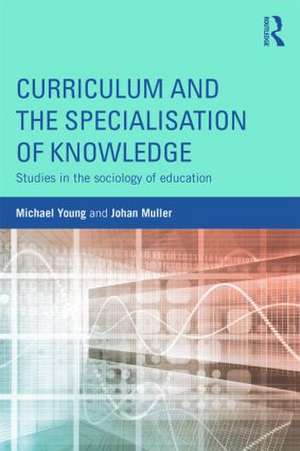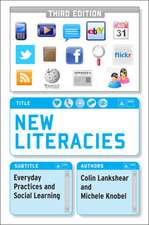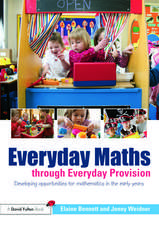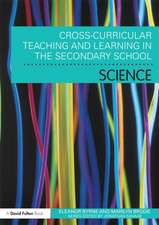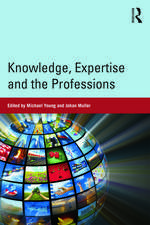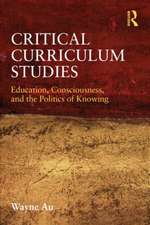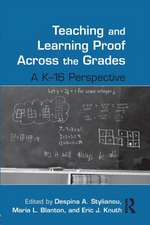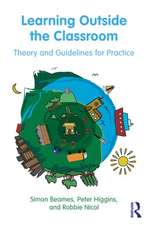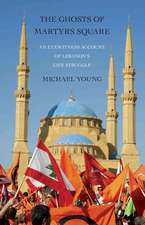Curriculum and the Specialization of Knowledge: Studies in the sociology of education
Autor Michael Young, Johan Mulleren Limba Engleză Paperback – 14 sep 2015
Papers jointly written by the authors over the last eight years are revised for this volume. It draws on the sociology of knowledge and in particular the work of Emile Durkheim and Basil Bernstein, opening up the possibilities for collaborative inter-disciplinary enquiry with historians, philosophers and psychologists. Although primarily directed to researchers, university teachers and graduate students, its arguments about specialised knowledge have profound implications for policy makers.
| Toate formatele și edițiile | Preț | Express |
|---|---|---|
| Paperback (1) | 363.22 lei 3-5 săpt. | +19.15 lei 5-11 zile |
| Taylor & Francis – 14 sep 2015 | 363.22 lei 3-5 săpt. | +19.15 lei 5-11 zile |
| Hardback (1) | 1001.84 lei 6-8 săpt. | |
| Taylor & Francis – 21 sep 2015 | 1001.84 lei 6-8 săpt. |
Preț: 363.22 lei
Nou
Puncte Express: 545
Preț estimativ în valută:
69.51€ • 72.16$ • 57.96£
69.51€ • 72.16$ • 57.96£
Carte disponibilă
Livrare economică 03-17 martie
Livrare express 15-21 februarie pentru 29.14 lei
Preluare comenzi: 021 569.72.76
Specificații
ISBN-13: 9781138814929
ISBN-10: 113881492X
Pagini: 252
Dimensiuni: 156 x 234 x 15 mm
Greutate: 0.36 kg
Ediția:1
Editura: Taylor & Francis
Colecția Routledge
Locul publicării:Oxford, United Kingdom
ISBN-10: 113881492X
Pagini: 252
Dimensiuni: 156 x 234 x 15 mm
Greutate: 0.36 kg
Ediția:1
Editura: Taylor & Francis
Colecția Routledge
Locul publicării:Oxford, United Kingdom
Public țintă
Postgraduate and ProfessionalCuprins
Section one: Setting the scene
Chapter one: Introduction
Chapter two: Truth and truthfulness in the sociology of educational knowledge
Section two: Knowledge and curriculum futures
Chapter three: Education, globalization and the ‘voice of knowledge’
Chapter four: Alternative education futures for a knowledge society
Chapter five: Three educational scenarios for the future: lessons from the sociology of knowledge
Chapter six: Curriculum and the question of knowledge: the legacy of Michael Gove and beyond
Chapter seven: The future of knowledge and skills in science and technology higher education
Section three: The idea of powerful knowledge
Chapter eight: What are schools for?
Chapter nine: On the powers of powerful knowledge
Chapter ten: Overcoming the crisis in curriculum theory
Chapter eleven: The promise and pathos of specialized knowledge
Section four: Universities, professions, and specialized knowledge
Chapter twelve: The body of knowledge
Chapter thirteen: Disciplines, skills and the university
Chapter fourteen: Every picture tells a story: epistemological access and knowledge
Chapter fifteen: Towards the sociology of professional knowledge
Chapter one: Introduction
Chapter two: Truth and truthfulness in the sociology of educational knowledge
Section two: Knowledge and curriculum futures
Chapter three: Education, globalization and the ‘voice of knowledge’
Chapter four: Alternative education futures for a knowledge society
Chapter five: Three educational scenarios for the future: lessons from the sociology of knowledge
Chapter six: Curriculum and the question of knowledge: the legacy of Michael Gove and beyond
Chapter seven: The future of knowledge and skills in science and technology higher education
Section three: The idea of powerful knowledge
Chapter eight: What are schools for?
Chapter nine: On the powers of powerful knowledge
Chapter ten: Overcoming the crisis in curriculum theory
Chapter eleven: The promise and pathos of specialized knowledge
Section four: Universities, professions, and specialized knowledge
Chapter twelve: The body of knowledge
Chapter thirteen: Disciplines, skills and the university
Chapter fourteen: Every picture tells a story: epistemological access and knowledge
Chapter fifteen: Towards the sociology of professional knowledge
Descriere
This book presents a new way for educators at all levels - from early years to university - to think about curriculum priorities. It focuses on the curriculum as a form of specialised knowledge, optimally designed to enable students to gain access to the best knowledge available in any field.
